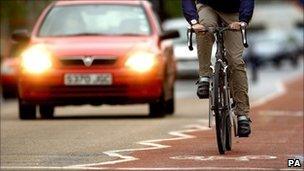Bristol Cycling City scheme misses target
- Published

Bristol was awarded Cycling City status by the government in 2008
A project aimed at doubling the number of regular cyclists in Bristol has failed to reach its targets.
Bristol was awarded 拢22m in 2008 and named Cycling City to encourage residents to ride bicycles.
Statistics obtained by the 大象传媒 show that, according to the city council, bike use has only risen by a third at the end of the three-year programme.
Project manager Ed Plowden said bike use had risen more quickly than other areas because of the project.
"In London it took them about nine years to double cycling," said Mr Plowden.
"At the moment - 1% of all journeys are being done by bike and they've got a target to get to 5% by 2026. Bristol is already at 5% and that's partly due to the growth during Cycling City."
In 2008, there were 25,000 bike users in Bristol while there are now around 33,000, the council figures show.
About two-thirds of the 拢22m was spent on cycling infrastructure, such as 13 miles of off-road cycle tracks including the Festival Way to Ashton Court, the Frome Greenway and a link in St Werburghs.
The remaining third went towards "softer" schemes geared towards changing people's attitudes to cycling such as training in schools and workplaces.
This balance between "hard" and "soft" projects has been called into question by some.
Martin McDonnell, secretary of the pressure group Bristol Cycling Campaign, said: "I think there could be a lot more publicity. If you come into Bristol how do you know that it's a Cycling City? There aren't big banners up anywhere.
"There are certain routes which aren't complete and they start somewhere not very sensible. They've also been doing things like putting bollards in the middle of the cycleway which can be dangerous."
The leader of the opposition Conservative group on Bristol City Council, Geoff Gollop, said the new cycle routes were to the detriment of motorists.
He said: "The Cycling City initiative brought in match-funding which has delivered new cycling routes but these have largely been achieved at the expense of the majority of road users - by reducing road space or capacity.
"Whilst we recognise the merits of promoting cycling as a leisure activity for the individual - delivering personal health benefits and helping to improve the environment for all - this form of travel is unlikely in the near future to be a major means of commuting.
"We do not believe the 拢22m project can be said to have been successful even in its own terms."
- Published7 December 2010